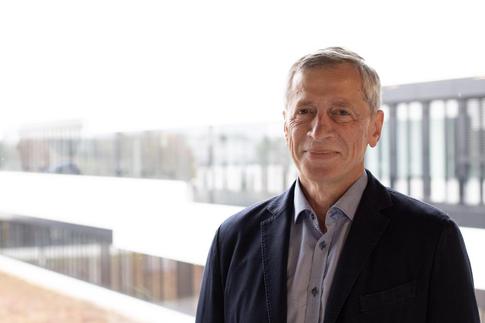XFEL: Prestigious scientific grant awarded to European XFEL group leader
Prestigious scientific grant awarded to European XFEL group leader

European XFEL Theory Group Leader Prof. Dr. Alexander Lichtenstein. Copyright European XFEL
Together with colleagues from Uppsala University in Sweden and Radboud University in the Netherlands, European XFEL theory group leader Prof. Dr. Alexander Lichtenstein has been awarded a European Research Council Synergy Grant worth eight million Euros.
Over the six year period of the project, the international team, consisting of Prof. Dr. Alexander Lichtenstein who has a joint affiliation at European XFEL and the Universität Hamburg, together with Prof. Dr. Olle Eriksson from Sweden and Prof. Mikhail Katsnelson from the Netherlands, will develop new theoretical foundations to close knowledge gaps revealed by experiments at X-ray free-electron lasers.
European XFEL managing director Prof. Dr. Robert Feidenhans’l said: “We are very proud that Alexander Lichtenstein and colleagues have received this prestigious award for developing novel theories of how to interpret ultrafast phenomena such as those being studied at X-ray free-electron lasers. This kind of work is extremely important for European XFEL. The novel ideas and theories that result from this international project will highlight a path for future instrument and experiment development, all of which will further enrich our understanding of the fundamentals of nature.”
Experiments with light sources such as X-ray free-electron lasers like the European XFEL, produce results that change our understanding about how light and matter interact. A class of materials of particular interest in this context is the so-called correlated electron systems. Electronic correlations are effects of interactions between individual electrons in a solid.
In order to understand the results of the experiments at European XFEL, scientists need a theoretical framework that is coupled to the experimental work. However, many of these necessary physical theories are currently lacking. Furthermore, an interpretation can only be reliable if observations can be explained or predicted with a suitable theory. The project "Ultrafast dynamics of correlated electrons in solids" (FASTCORR), now funded by the European Research Council, aims to close this knowledge gap.
The ERC Synergy Grant research team has set itself the goal of developing software applications that can interpret and predict ultrafast phenomena in correlated electron systems. This requires the ability to process large amounts of data. Prof. Dr. Alexander Lichtenstein will develop the new software and applications - based on the theoretical principles of Prof. Mikhail Katsnelson from Radboud University in the Netherlands. Prof. Dr. Olle Eriksson from Uppsala University in Sweden will focus on data mining, and the analysis of large amounts of data.
ERC Synergy Grant
The ERC Synergy Grants of the European Research Council (ERC), awarded for the first time in 2012, are a funding instrument for outstanding research groups. The interdisciplinary teams, consisting of two to four scientists, will bring together complementary skills, knowledge and resources in innovative ways. The funding can amount to up to ten million euros and can be awarded for a period of up to six years.
